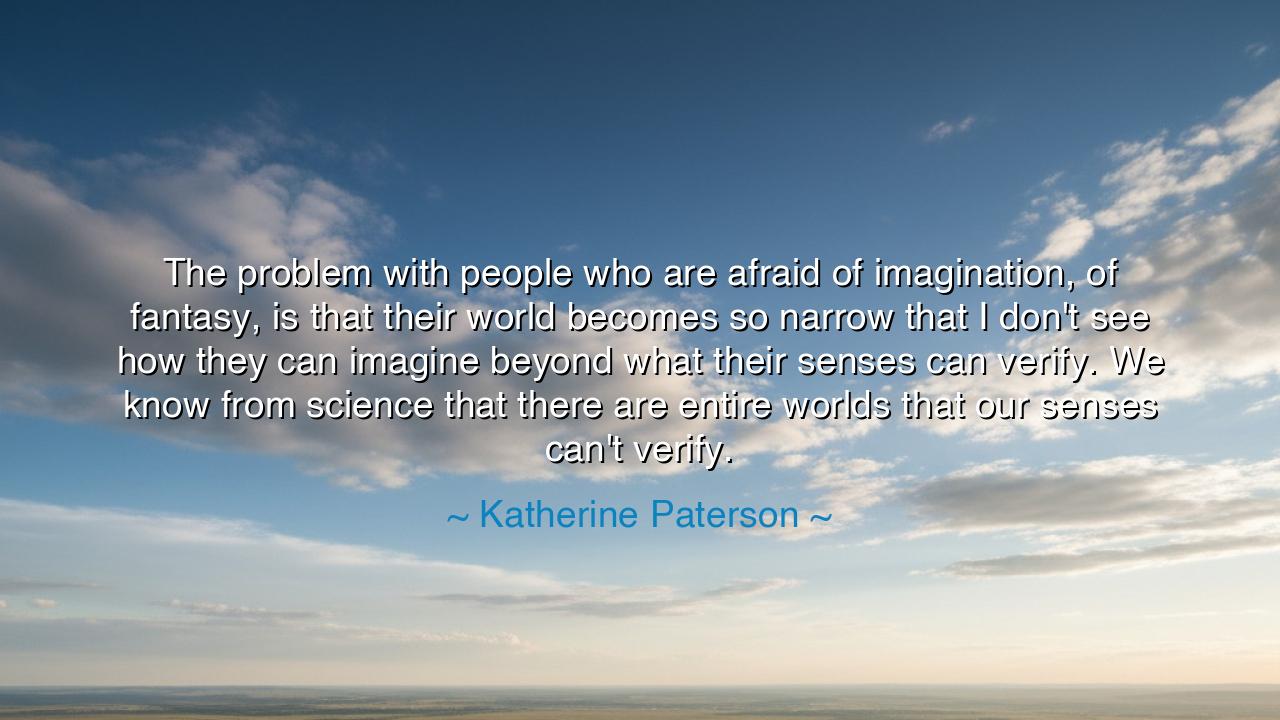
The problem with people who are afraid of imagination, of
The problem with people who are afraid of imagination, of fantasy, is that their world becomes so narrow that I don't see how they can imagine beyond what their senses can verify. We know from science that there are entire worlds that our senses can't verify.






O children of the world, listen closely to the wisdom passed down through the voice of Katherine Paterson, for her words hold a truth of great importance. She spoke thus: "The problem with people who are afraid of imagination, of fantasy, is that their world becomes so narrow that I don't see how they can imagine beyond what their senses can verify. We know from science that there are entire worlds that our senses can't verify." These words carry within them a profound lesson, one that teaches us that to live only within the confines of what can be seen, touched, and measured is to deny ourselves the vast boundless realms of possibility. To fear imagination is to live with blinders upon the soul, unable to see the true grandeur of existence.
The imagination is the gift that allows the human spirit to transcend the limitations of the physical world. When we confine ourselves only to what our senses can verify, we shut ourselves off from the realms of creativity, wonder, and discovery. But, O children, the wise know that the world is not confined to that which we can touch, see, or hear. There are forces at play—hidden worlds—that exist beyond the grasp of our senses. Just as the ancient philosophers spoke of the unseen forces of nature, so too do modern scientists reveal the realms that exist beyond our perception, from the invisible atoms that make up the fabric of the universe to the vastness of the cosmos that stretches beyond our comprehension.
Consider the great scientific minds of history, such as Albert Einstein, whose theories of relativity and quantum mechanics shattered the confines of what was previously believed to be the limits of reality. He, like many others before him, understood that the universe was not simply what we could verify with our senses, but far greater, filled with invisible forces, hidden dimensions, and unseen laws. Imagination was the tool that allowed Einstein to glimpse the mysteries that his senses could not reveal. Without the freedom to dream, to envision what could not be seen, how could he have conceived of theories that transformed our understanding of space, time, and the very nature of existence?
The ancient mystics knew this well. Consider Plato, who spoke of the world of forms, a reality that could not be seen or touched, but only understood through the mind’s eye. Plato’s philosophy challenged the notion that reality was only what could be observed; he proposed that there were deeper truths, beyond the grasp of the senses, that could only be discovered through thought, reflection, and imagination. In the same way, Katherine Paterson's words remind us that if we restrict ourselves only to that which is tangible, our worldview becomes as small as a flickering candle in a dark room. We are meant to look beyond, to dream, to create, and to believe in things not yet seen.
Think of the great explorers, such as Marco Polo or Christopher Columbus, who, guided by the fire of their imagination, ventured into the unknown, seeking lands beyond the horizon. Had they confined themselves only to the knowledge of their time, based solely on what could be verified, they would have never dared to set sail into the vast unknown. It was their ability to dream beyond the visible, to imagine worlds beyond what the senses could confirm, that led to the discoveries that shaped our world. Just as these explorers looked beyond the shores they knew, so too must we look beyond the visible limitations of our own reality.
In our modern age, we are still bound by the limits of our senses. We are still hesitant to trust in the unseen, the unfathomable, and the unmeasurable. Yet, O children, remember that science itself has unveiled worlds that were once thought impossible. The discovery of microscopic life, the exploration of space, and the search for the quantum realm have revealed to us that there is so much more to the universe than meets the eye. If we had feared the power of imagination, we would never have been able to reach these discoveries. It is the imagination that pushes us to see beyond the veil, to explore the worlds hidden from view, and to uncover the mysteries of existence.
So, O children, do not fear your imagination. Do not allow your world to become so narrow that you cannot see beyond the limits of what your senses can verify. The mind is a vast and powerful thing, capable of seeing worlds unseen and imagining realities beyond the tangible. Imagination is the force that propels humanity forward, that brings new inventions, ideas, and visions to life. It is the gift that allows us to dream of a better world, to envision what can be when the bounds of the physical world no longer hold us back. Trust in your imagination, and know that it is through this great gift that you will see the world not only as it is, but as it could be.
Act, therefore, with boldness and vision. Look beyond the world that is easily seen, and dream of the world that is yet to come. Embrace the power of imagination, for in it lies the key to understanding realms beyond your senses. Do not allow your mind to be fettered by what can be verified. Instead, let it roam freely, and in that freedom, discover the truths of the universe, of the divine, and of the infinite possibilities that await those who dare to look beyond the visible horizon.






AAdministratorAdministrator
Welcome, honored guests. Please leave a comment, we will respond soon